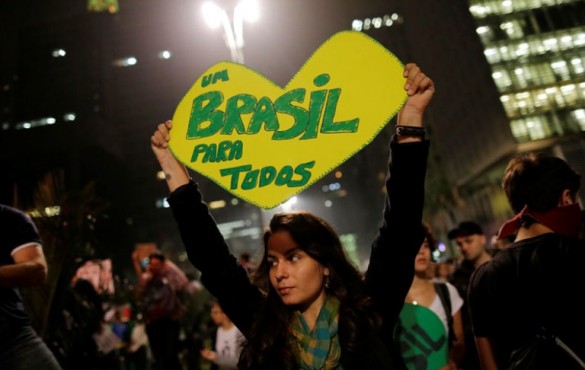
Nearly half the Brazilian public believes a military coup is justifiable there if government corruption is high, according to the 2014 survey by the Latin American Opinion Project (LAPOP) at Vanderbilt University.
The survey should give pause to Brazilian President Dilma Rousseff, who faced a large protest March 15 in the streets of São Paulo where demonstrators demanded her impeachment or resignation. Brazil is in the midst of an economic crisis and also a corruption scandal that involves Rousseff’s political party, the Worker’s Party.
“Although a military intervention seems far from likely, and an impeachment process would require direct evidence against her, [rquote]President Rousseff would be well-advised to redouble efforts to combat corruption and economic stagnation[/rquote], or challenges to her government may continue to escalate while the public’s commitments to democratic values may continue to deteriorate,” writes Guilherme Russo, a Vanderbilt graduate student in political science and author of the new AmericasBarometer: Topical Brief on Brazil (Spanish version) (Portuguese version).
In data collected in 2014, 47.6 percent of Brazilians said a coup was justified if corruption was high, up from 36.3 percent in 2012.
Interestingly, acceptance of military intervention does not only come from those who disapprove of the current government. Among those who perceive that Brazil’s president is doing a “very good” or “good” job, 45.6 percent believe a coup is justified if corruption is high. That rises to 46.4 percent among those who evaluate the president’s performance as “neither good nor bad” and tops out at 52.8 percent for those who give Rousseff a job approval rating of “bad” or “very bad.”

“Therefore, the high percentage of approval for a military intervention in times of corruption presented here cannot be interpreted as a direct manifestation of support for the armed forces to oust President Rousseff,” writes Russo. “Rather, we see widespread tolerance for undemocratic measures to combat corruption in politics.”
LAPOP develops, implements and analyzes the AmericasBarometer public opinion surveys. Since the 1970s, LAPOP has gathered a treasure trove of opinion data containing political perspectives from Latin American and Caribbean citizens. LAPOP data and reports are available to interested researchers at the LAPOP website.